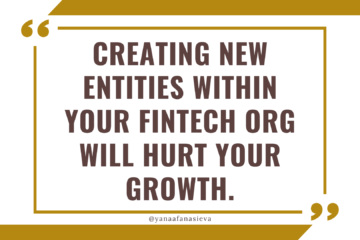To Open Bank Accounts, FinTech Startups Must Follow A Strategy That’s OPPOSITE to What’s Needed for FinTech Licensing
I know, it sounds counter-intuitive and confusing, but it’s the reality: what you do as a FinTech startup in order to open your bank accounts is almost entirely opposite to what you do to secure a license application.
Here is how these relationships are fundamentally different:
- Bank accounts last for 2-3-4 years and then something is likely to change, or one of the parties will move on. It’s a commercial relationship.
- Licenses are for decades or even a lifetime. This is your relationship with the government.
How these fundamental differences will impact your tactics and your success:
BANK
You are much more selective with the bank, you tell them and show them what they need to know and you play the game of a “negative selection”, e.g. if they don’t find any negative, adverse, disqualifying information about you, they will likely approve you. You need to know where their risk appetite is and what is a no-go for this bank because the decision to say “no” is an easy decision for the bank. In a way, you are playing against a negative checklist in the mind of a banker. Because it is such an easy “no”, you send applications to as many banks as possible and you always keep your eyes and ears open and ready to apply for a new bank account on any given Tuesday.
LICENSE
You play a long game of a “positive selection” where you have to prove to the regulator that you have a set of positive qualities and mandatory attributes. It’s a very difficult decision for a regulator to reject the application, which is why they offer you a number of opportunities to prove yourself and explain yourself. It is a very time-consuming process, which is why you don’t send 5 different license applications at the same time hoping to see what happens, but rather prepare one good application and focus all-in on making it successful.
As I mentioned before, corrections and adjustments I typically make in most bank account applications have nothing to do with AML and everything to do with a consistent description of the business model.
Just sharing your AML Policy or even your latest AML audit report will NOT be sufficient to secure a banking relationship.
You need to know what you are doing and how your answers will be interpreted.
Not every bank is equipped or interested to serve startups or open segregated accounts. Some banks are interested in facilitating small amounts of many retails clients while other banks are only interested in larger accounts with large volumes. Some banks don’t serve certain industries or segments. Some banks offer sub-IBAN services or multi-currency accounts, while others don’t. Some banks only accept business customers from a certain country while others accept clients from other countries. It’s important to do your homework and understand the bank’s profile before reaching out to them.
This is exactly why I’m inviting you to join my brand new workshop on HOW TO OPEN BANK ACCOUNTS FOR FINTECH STARTUPS
After completing this 90-minute workshop, you will have a crystal clear plan to approaching banking partners and will know exactly what to expect, what to say, and what to submit to successfully secure banking relationships, complete regulatory due diligence, and even reverse the previous rejection.
AGENDA
- Before you go to the bank (website, trade register, corporate structure)
- Standard documentation package (special attention given to the business model description, flow of funds examples, source of funds evidence, and customer target market description)
- List of FinTech-friendly banks and their expectations
- How to approach the bank and prepare your documentation
- How to answer due diligence questions during your application review
- How to reverse the (initial) rejection
The new business season is around the corner and it’s about time for you to secure more partnerships and accounts with banks and other financial partners!



